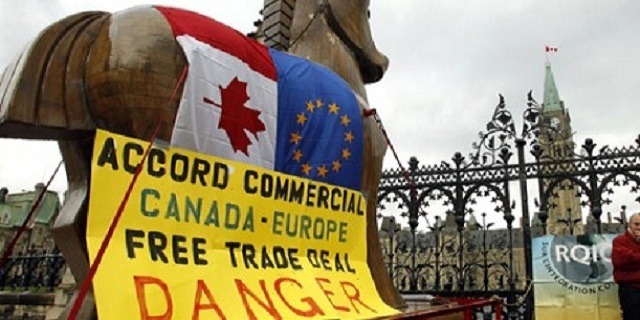One year on from the end of EU-Canada negotiations on a Comprehensive and Economic Trade Agreement (CETA), the fundamental risks it poses to democracy, citizens’ protections and the environment loom larger than ever, writes Natacha Cingotti, trade campaigner at Friends of the Earth Europe.
One year ago today, the European Commission announced the end of the negotiations on a Comprehensive and Economic Trade Agreement (CETA) between the EU and Canada. CETA is the first in a series of new-generation trade agreements, negotiated and concluded by the European Commission on behalf of European Member States.
CETA is commonly referred to by European civil society groups as the ‘ugly little brother’ of the much more hyped Transatlantic Trade and Investment Treaty (TTIP). But civil society groups fear that it could in fact allow several of the dangerous aspects of the strongly criticised EU-US negotiations to go through, with much less publicity.
While the final signature on CETA has been postponed on several occasions, European Member States could come to an agreement by the end of the year. If the environment right and freedoms of citizens across Europe are to be protected, then national governments, European and national parliaments must strongly reject the proposed text on an EU-Canada trade agreement.
What’s at stake?
There are a number of problematic aspects to the proposed CETA in relation to essential protections for democracy and the environment. The examples detailed below make CETA unacceptable for Friends of the Earth Europe and constitute particularly dangerous precedents in relation to the ongoing EU-US trade negotiations:
- CETA would provide foreign investors with special rights at the expense of democracy and citizens’ protections
ISDS allows foreign investors to sue host governments in secret, private tribunals if they deem that their profits or investment potential are affected by new laws or changes in policy. The companies can seek compensation which may mount to millions of Euros.
This fundamentally unfair and undemocratic system allows foreign investors to socialise their investment risks, passing on the burdens to taxpayers. Also, it creates a dangerous regulatory chill on decision-makers who are keen to introduce ambitious regulations to protect citizens and the environment.
The reforms announced by the European Commission in relation to the EU-Canada agreement fail to address the fundamental flaws of the mechanism. They would also not prevent worrying cases from happening again.
This is especially worrying when looked at in relation to the on-going negotiations on an EU-US trade agreement:
– On the one hand, the inclusion of an investor-state dispute settlement mechanism in the EU-Canada agreement would allow US companies with subsidiaries in Canada to sue European Member States for financial compensation under its provisions. This means that whatever reforms are agreed in the context of TTIP will be useless in preventing cases under the terms of the CETA agreement, since US investors will be able to sue via their Canadian subsidiaries.
– On the other hand, the new ‘investment court system’ announced by EU trade commissioner Malmström will not apply to the EU-Canada agreement. While this so called post-ISDS proposal anyway fails to address the fundamental flaws of the current investment protection provisions, it also shows that there is no real commitment to put an end to privileges for foreign investors and that CETA should be opposed at all costs.
- CETA includes dangerous provisions in relation to food safety standards
Analysis of the texts published in September last year shows that the EU has agreed to co-operate with Canada, allowing low levels of GMO contamination in food and seed. In addition, a leaked letter from the EU’s former food safety chief shows a willingness to increase imports of GM rapeseed as part of the Canadian trade deal.
The EU’s right to protect the environment and citizens is enshrined in European treaties and cannot be simply signed away through a trade deal. Even low levels of GM contamination pose a threat to farmers, crops and the countryside. Changes to the certification process could open the floodgates to increasing levels of GM imports.
Once Europe has accepted low levels of GM contamination, there is a real risk that the existing protection will be whittled away. This trade deal agreed shows that the EU negotiators are too happy to trade away citizens’ rights and environmental protections in order to benefit industry.
It also sets a dangerous precedent for the TTIP negotiations. If agreed, TTIP would be the biggest free trade deal in history, depending largely on reducing safety standards and laws determined to be problematic for industry. US negotiators and industry lobbyists have been pushing for weaker rules on GM imports, arguing that the “zero tolerance” rule is a barrier to trade, and damages business for US exporters.
In its current form, the EU-Canada trade agreement is a threat to democracy and essential citizens’ protections, and it could provide a backdoor for the TTIP under negotiations. That is why Friends of the Earth Europe supports the civil society mobilisation against CETA and calls on national and European decision-makers not to let it go ahead.
Find out more about the other dangerous aspects of CETA
How can you get involved?
– Write to your decision-makers and call on them to stop CETA!
– If you haven’t done so already, sign the petition to stop TTIP and CETA!







